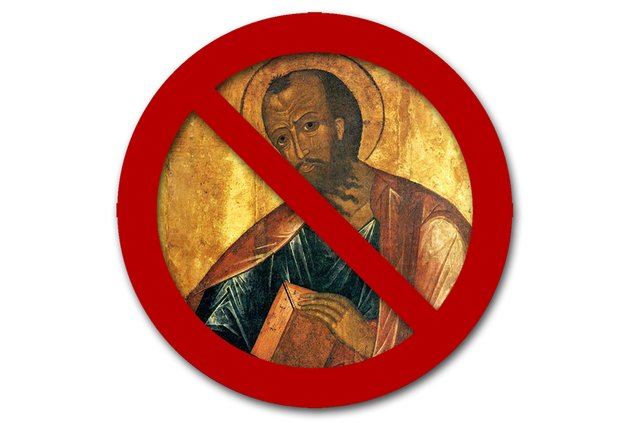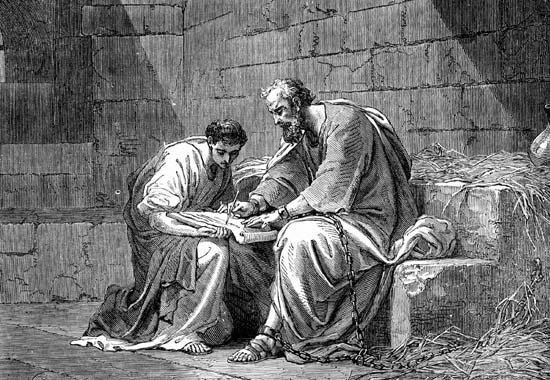Can a Christian be an Anarchist Without Rejecting Paul? (Christian Anarchy - Part 5)

If a Christian wants to hold to the belief that God’s word is true, yet also identifies as an anarchist, what are they to do about Romans 13?
Welcome to Part 5 of my series on Christian Anarchy. If you want to read from the beginning (something that I, of course would recommend) here are the links:
- Can a Christian be an Anarchist?
- All Christians Should be Socialists
- What Does the Bible Actually Say About Government?
- Render to Caesar That Which is Caesar's
Here’s the text we're looking at today:
Let every person be subject to the governing authorities. For there is no authority except from God, and those that exist have been instituted by God. 2 Therefore whoever resists the authorities resists what God has appointed, and those who resist will incur judgment. 3 For rulers are not a terror to good conduct, but to bad. Would you have no fear of the one who is in authority? Then do what is good, and you will receive his approval, 4 for he is God's servant for your good. But if you do wrong, be afraid, for he does not bear the sword in vain. For he is the servant of God, an avenger who carries out God's wrath on the wrongdoer. 5 Therefore one must be in subjection, not only to avoid God's wrath but also for the sake of conscience. 6 For because of this you also pay taxes, for the authorities are ministers of God, attending to this very thing. 7 Pay to all what is owed to them: taxes to whom taxes are owed, revenue to whom revenue is owed, respect to whom respect is owed, honor to whom honor is owed.
Romans 13:1-7 (ESV)
The simple solution: Reject Paul’s writings from the canon of Scripture.

This is actually a pretty popular approach taken by Christian anarchists. The world-famous Russian author and Christian anarchist Leo Tolstoy said this in his book My Religion:
Imagine a number of men rowing a boat, a pilot steering. The men rely upon the pilot, and the pilot steers well; but after a time the good pilot is replaced by another, who does not steer at all.
If it isn’t obvious from the text, Jesus was the original and true pilot of the ship. But then Paul took the reins and let the ship run amok. The only solution therefore is to give control back to Jesus. Tolstoy and many others accuse Paul of perverting and corrupting the message of Jesus.
So there. Problem solved. Paul’s words are of no relevance to Christians and we can live in open defiance of the state. Hooray!
A Better, but Admittedly Less Simple Solution
There's a reason why Christians are commanded to obey their earthly "authorities" and it isn't because those men have the right to rule. It's not just government that we're told to obey either. In this shocking passage, and others like it, slaves are commanded to submit to their masters:
5 Bondservants,[slaves] obey your earthly masters with fear and trembling, with a sincere heart, as you would Christ
Ephesians 6:5 (ESV)
Horrifying! I can almost hear my readers exclaim. But the passage doesn't end there.
6 not by the way of eye-service, as people-pleasers, but as bondservants of Christ, doing the will of God from the heart, 7 rendering service with a good will as to the Lord and not to man, 8 knowing that whatever good anyone does, this he will receive back from the Lord, whether he is a bondservant or is free. 9 Masters, do the same to them, and stop your threatening, knowing that he who is both their Master and yours is in heaven, and that there is no partiality with him.
Ephesians 6:6-9 (ESV)
This passage points out where our true allegiance lies and who the real Master is. We are to render our services to those who claim authority over us with a glad heart to display God's light unto them.
We can show our masters that we are freer than they are by committing ourselves as slaves to Jesus Christ.
The apostle Peter writes in agreement with Paul's statement in Romans 13 and continues with themes similar to those we see in Paul's letter to the Ephesians:
13 Be subject for the Lord's sake to every human institution, whether it be to the emperor as supreme, 14 or to governors as sent by him to punish those who do evil and to praise those who do good. 15 For this is the will of God, that by doing good you should put to silence the ignorance of foolish people. 16 Live as people who are free, not using your freedom as a cover-up for evil, but living as servants of God.17 Honor everyone. Love the brotherhood. Fear God. Honor the emperor.
18 Servants, be subject to your masters with all respect, not only to the good and gentle but also to the unjust. 19 For this is a gracious thing, when, mindful of God, one endures sorrows while suffering unjustly.20 For what credit is it if, when you sin and are beaten for it, you endure? But if when you do good and suffer for it you endure, this is a gracious thing in the sight of God. 21 For to this you have been called, because Christ also suffered for you, leaving you an example, so that you might follow in his steps.
1 Peter 2:13-21 (ESV)
If we act as "disobedient servants" we would create a stumbling block for our own witness. The world might see Christians as worse sinners than they are and condemn them for it. The Bible asks us to be obedient because it will help us to shine the light of Christ. If we live in love, even (and especially) through unjust suffering we will be noticed for our works and Christ will be able to advance His gospel through our actions.
This is probably a controversial opinion among believers, but the notion of being a stumbling block is dependent upon personal and cultural values of the day. If/when those values finally move away from state-worship I believe that Christians would be wholly right to reject those masters. Because by doing so we wouldn't be causing others to reject our witness. We could shine the light of Christ as members of a culture that is outgrowing it's masters. But until then, we obey.
A Brief Word About Authorities Being "Ordained" or "Instituted" by God.
These words do not mean that God has transferred moral authority. They do not mean that God has approved or blessed any sort of earthly kingship.
Do you know what else has been ordained by God? Every single thing that has happened in the history of the universe. Every person, every action whether good or evil is part of the Divine plan.
Paul refers to the state as an instrument that God uses for good - to punish the unjust and keep the good from harm. But to quote Philip K. Dick, "God's M.O. is to transmute evil into good. If He is active here, He is doing that now, although our eyes can't perceive it"
Throughout all of Scripture we see God using evil acts, evil men and evil empires to carry out his will and bring his plan to fruition. It's no different with the state.
There are Times When A Christian MUST Disobey

In one of the passages we looked at above, Ephesians 6, slaves are told to obey their masters not as people-pleasers, but as slaves of Christ. This means our obedience to earthly rulers only extends so far as our obedience to Christ. We cannot obey a decree to break a command of God.
That's the "loophole" that allows for civil disobedience.
1 And as they were speaking to the people, the priests and the captain of the temple and the Sadducees came upon them, 2 greatly annoyed because they were teaching the people and proclaiming in Jesus the resurrection from the dead. 3 And they arrested them and put them in custody until the next day, for it was already evening.
...
18 So they called them and charged them not to speak or teach at all in the name of Jesus. 19 But Peter and John answered them, “Whether it is right in the sight of God to listen to you rather than to God, you must judge, 20 for we cannot but speak of what we have seen and heard.”
Acts 4:1-3, 18-20 (ESV)
This passage is one of several examples of the apostles disobeying direct orders from the authorities. They could not obey any decree that would make them act in direct disobedience to God. In any matters of God vs. state, God wins.
Christians are NOT to be Revolutionaries

Not in the sense of rising up violently against rulers, even corrupt rulers. Let's remember that the emperor at the time of these writings was the bloodthirsty Nero. You know, the guy who turned Christians into human candlesticks.
Our revolution is to change hearts, souls and minds and bring them to Christ. To paraphrase another verse from Ephesians 6, our battle is not against flesh and blood but against the cosmic powers of this present darkness and the spiritual forces of evil in this age.
Well, I did it. I said you would have to wait until Monday, but I did it today. But the challenge isn't over. Tomorrow I'm going to be discussing the big bag of questions that is the Old Testament.
~Seth
Nice work Seth.
It's almost impossible to do a complete study on this, because there's so much involved. A couple of thoughts...
In both Romans and 1 Peter, the responsibility of the government is laid out. Since this is clear, how much must we obey beyond that? Where does disobedience become okay? Sometimes it's not black and white.
An example - if we know that our tax extortion... er contribution, is being used for abortion, wars, etc., are we justified in withholding our "donations"? What about surveillance? Must we comply? Paul could never have foreseen these things, and Jesus doesn't really make any statements clear enough to directly apply.
I agree that we should not be revolutionaries. But when does the rebellion become the government? If both sides are compelling you to fight, how do you know what to do? Which is ordained?
I'm not trying to buttonhole you. These are legitimate thoughts that I wrestle with just about every day. But we're also told to be free if we're able, so perhaps leaving is the right answer.
I agree that there isn't really a simple answer. That's part of the reason why I categorize obedience to the state under the whole "not being a stumbling block to others" thing. That means that the laws of men aren't black and white rules that we must follow... it's more about keeping up appearances so that our witness isn't ruined.
Your question, "when does the rebellion become the government?" Is a great and difficult question. It will be very difficult to determine when exactly we've reached that moment. But I think that when the government is seen as the enemy by the culture at large, we will be right to defend ourselves against them.
But then again, I may be wrong. Like you said, the Bible doesn't give clear instruction on these things.
This is really well done and covers the most important bases.
I couldn't find anything to object to in your analysis.
Key Point: God has more important work for Christians than trying to change their political-economic environment. Wherever we are, there are people who need to hear the Good News.
You hit the nail right on the head with this comment.
Hi Stan, I appreciate you being in this discussion and giving anarchy consideration. Though I disagree with your 'key point'. There really is not anything more important than correcting our political economic view, and to embrace the truth of the world we live in, and to REJECT wholly what Christ would have spit out of his mouth. I am certainly new to anarchy as a philosophy, and have much action to take as a follower of Christ. Also, the 'Good News' is very distorted within Christian circles today— a direct result of idolizing the Bible and following it's misdirection, instead of relying on the spirit, and the spirit alone. Cheers to Anarchy. We have a lot of work to do to define what this actually looks like!
Fine, if you can tell whose voice you are listening to. Three times in the wilderness Jesus quoted scripture to refute Satan. What will you quote?
We read Paul's Letter to the Romans as scripture for us. Paul wrote it to the church in Rome, where there had been enough civil disturbance within the Jewish community that they were evicted from Rome.
Could Paul have been encouraging the church there to really stay legal and avoid rocking any boats at such an uneasy time as Jews were being allowed to return to Rome?
I think there may be some value to what you're saying, but I don't think Paul's message is specific to the church in Rome. What he writes is consistent with the message of other Biblical writers in other contexts.
Thanks for commenting!
I am not saying that it was only relevant to Rome, but I do believe that the context is more relevant than many readers think.
We tend to apply passages universally, unless they seem too extreme, like, "Go, sell everything you have, and give it . . ."
There are themes that run through Pauls writing; I do not see this passage as a principal theme in Paul. I do think that the Roman situation was complicated. The church in Rome seems to have been predominantly Jewish, without Roman citizenship, and as such would have been on shaky ground. I think today we have churches and missionaries in similar situations.
When we live in a foreign country, we respect the government there, but we do not act traitorously with respect to our native country. We tend to forget that our citizenship in the New Jerusalem is the one that counts, and here, whatever nation "here" might be, we are at most resident aliens. As such, we need to live respectfully and keep our noses clean.
God is only a bigger authority than State, it's really the Big Boss, so obeying him doesn't sound like anarchy to me.
In fact anarchy means "no rulers" and just means not any single ruler, doesn't matter if he is in the skies or on earth.
Christian anarchy it's a bit like decaffeinated coffe to me, if I may explain it like this.
Still I respect your vision and try to understand it.
I actually address this conundrum at the beginning of the series. I say that a Christian technically cannot be a pure anarchist because we have a king in heaven. But we should be anarchists in terms of how we view humanity.
The creator of the universe has the moral right to rule over what he made. But beings created equally do not.
Thanks for your comment.
You're welcome!
I agree that technically may not be Anarchy, but somehow may be near to it, from the human perspective.
This is awesome!! Thank You.
You're welcome. I'm glad you liked it
Seth - you wrote “Throughout all of Scripture we see God using evil acts, evil men and evil empires to carry out his will and bring his plan to fruition. It's no different with the state. ”
So the Constitution could have been divinely inspired... ijs. ;)
Enjoyed this post! thanks for sharing
Thanks again, Seth, for articulating your thoughts on this subject. Indeed, Christians can and ought to be Anarchists! As for the content you write here, I much prefer option 1 - **Reject the writings of Paul! **. Perhaps it was Khalil Gibran in his book 'Jesus, The Son of Man' that swayed me most in this direction, but it is clear to me that Paul has misled the church enormously. Paul would have us follow doctrine and dogma. Christ would have us meditate and be present, in a nutshell. Such a view infers that we must use great discernment to critically evaluate Biblical text as well as newer found discoveries, such as Gnostic texts, to gain a better view of the life of Christ. Indeed, we must reject the Bible as 'The Word of God', which is an idolization of text. We must submit to the spirit, and the spirit alone.
2 Peter 3:14-16 Consider also that our Lord’s patience brings salvation, just as our beloved brother Paul also wrote you with the wisdom God gave him. He writes this way in all his letters, speaking in them about such matters. Some parts of his letters are hard to understand, which ignorant and unstable people distort, as they do the rest of the Scriptures, to their own destruction.…
So Peter endorsed Paul and his letters as Scripture.
Further, Jesus emphasized the importance of relying on Scripture ("Moses") to know anything else:
John 5:46-47 If you believed Moses, you would believe me, for he wrote about me. But since you do not believe what he wrote, how are you going to believe what I say?"
And from Luke 16:31, Jesus said:
"“He said to him, ‘If they do not listen to Moses and the Prophets, they will not be convinced even if someone rises from the dead.’"
"Moses and the Prophets" was a common term for the Scriptures in that day.